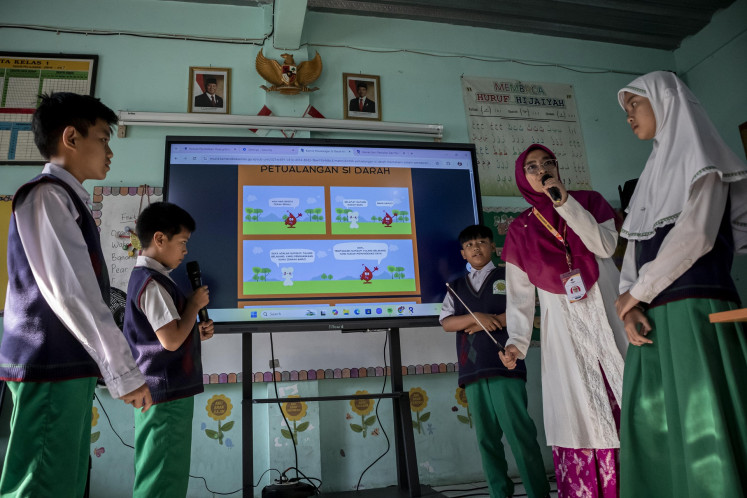Indonesian seniors more at ease with life
Change text size
Gift Premium Articles
to Anyone
 Elderly women at Kemiren Village take a break from pounding rice to make music with their tools, instead. (The Star/Asia News Network/-)
Elderly women at Kemiren Village take a break from pounding rice to make music with their tools, instead. (The Star/Asia News Network/-)
D
udih A. Zuhud is still working at 76 years old, even though he officially went into retirement six years ago. Daily needs became the primary motive behind his decision to go back to campus to teach English literature, as he claimed that his Rp 4 million (US$294) monthly pension was not enough to meet his needs.
“Sometimes I spend several millions of rupiah just on medicine,” said Dudih, who teaches at Padjadjaran University in Bandung, West Java.
However, despite his financial woes, Dudih said that he did not object to working at his age. “I am happy, life must go on,” he said.
Dudih is one of many elderly people in Indonesia who appear to be happy to continue working into old age. While many elderly people in other parts of the world are put in nursing homes or cared for at home by family, the elderly in Indonesia are enjoying working past their golden years.
Their situation was captured in a new World Bank report titled Live Long and Prosper, Aging in East Asia and Pacific, which was published on Monday.
The report highlights an interesting point about Indonesia: Although many Indonesians work until they get old, the rate of depression among the elderly remains low.
The report said that the rate of depression tended to increase with age. It suggests that the correlation between depression rates and age is much stronger in countries such as China and South Korea, but not in Indonesia.
In addition to being a type of disability, depression is also a cause of higher suicide rates among the elderly. The sharp increase in depression rates with old age is especially notable with high suicide rates among elderly in South Korea and Japan.
Depression is due partly to psychosocial stressors such as loss, loneliness, and lack of social sup-port and partly to increasing frailty and illness, according to the World Bank.
Raising educated children is apparently one source of happiness for senior citizens in Indonesia.
“Whether because of a source of pride and a sense of success in raising their children or simply as a reflection of the prospect of higher private transfers, the elderly in […] Indonesia are happier when they have more educated children,” the report says.
“A large number of adult children is associated with higher private transfers to older people, but higher educational attainment of children is also associated with higher transfers, suggesting that smaller family size can be offset in part by better educated and [paid] children.”
In both China and Indonesia, for example, poverty and depression rates are higher for older people who live separately from children living in the same area than for those who live with adult children or have migrant children living farther away, the report said.
As noted, the most obvious fiscal risks are posed by pension, health, and long-term care systems, all of which are affected by aging.
The fiscal risks are compounded in many East Asian and Pacific countries because governments are pursuing rapid coverage expansion of health insurance and pensions and exploring more active public financing for long-term care.
The report reveals that labor income remains the dominant source of support for the elderly in the region, often well into old age.
Djisman Simanjuntak, senior economist with the Centre for Strategic and International Studies (CSIS), said the results of the study conducted by the World Bank made sense on account of the nature of Indonesian people.
“Our people are accustomed to facing difficulties with courage, which is why the results are as contained in the report,” Djisman said. He added that several other studies had shown the same results, with the country’s happiness index remaining high despite Indonesia’s generally low income per capita.









